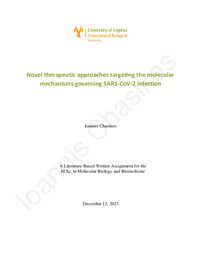Novel therapeutic approaches targeting the molecular mechanisms governing SARS-CoV-2 infection

View/
Date
2023Author
Chasikos, IoannisAdvisor
Charalambous, AnnaPublisher
Πανεπιστήμιο Κύπρου, Σχολή Θετικών και Εφαρμοσμένων Επιστημών / University of Cyprus, Faculty of Pure and Applied SciencesPlace of publication
CyprusGoogle Scholar check
Keyword(s):
Metadata
Show full item recordAbstract
Severe acute respiratory syndrome coronavirus 2 (SARS-CoV-2) is the causative agent of the ongoing worldwide pandemic of Coronavirus Disease 2019 (COVID-19), which remains a public health concern despite the successful rollout of effective vaccines. This is why several therapeutic strategies targeting molecular mechanisms of SARS-CoV-2 infection have been developed; they target viral entry into host cells, immune dysregulation, replication of the viral genome and proteolytic processing of the viral products. Targeting is achieved using multiple approaches including small inhibitory molecules, monoclonal antibodies and immunomodulatory drugs. Despite the existence of currently successful treatments, there is a growing need for novel therapeutic strategies due to the continuous evolution of new SARS-CoV-2 variants, capable of developing resistance to approved antivirals and due to the immune response elicited from vaccinations. These include further inhibition of viral targets, the use of antibody-mimetics, host-directed therapies and nucleic acid-based therapeutics. This bibliographical review attempts to provide a comprehensive understanding of how these novel therapeutic strategies elicit their antiviral effects, the advantages and disadvantages regarding their application and the challenges faced during their development and use.
Collections
Cite as
The following license files are associated with this item:

